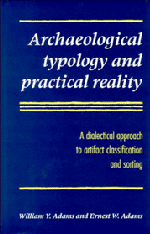 Archaeological Typology and Practical Reality
Archaeological Typology and Practical Reality Book contents
- Frontmatter
- Contents
- List of figures
- List of tables
- The archaeologist's preface
- The philosopher's preface
- PART I Introductory
- PART II The nature of types and typologies
- PART III Typology in action: the Medieval Nubian Pottery Typology
- PART IV Pragmatics of archaeological typology
- PART V Classification, explanation, and theory
- 22 The Typological Debate
- 23 Issues and non-issues in the Typological Debate
- 24 Conceptual problems
- 25 The use and abuse of theory
- 26 Paradigms and progress
- Appendices
- References
- Index
24 - Conceptual problems
Published online by Cambridge University Press: 23 November 2009
- Frontmatter
- Contents
- List of figures
- List of tables
- The archaeologist's preface
- The philosopher's preface
- PART I Introductory
- PART II The nature of types and typologies
- PART III Typology in action: the Medieval Nubian Pottery Typology
- PART IV Pragmatics of archaeological typology
- PART V Classification, explanation, and theory
- 22 The Typological Debate
- 23 Issues and non-issues in the Typological Debate
- 24 Conceptual problems
- 25 The use and abuse of theory
- 26 Paradigms and progress
- Appendices
- References
- Index
Summary
In its early days the Typological Debate was somewhat beclouded by the lack of an adequate conceptual vocabulary, a problem that has been common to all sciences in their formative stages. Commentators like Rouse (1939; 1960), Krieger (1944), Brew (1946: 44–66) and Taylor (1948: 113–51) had to use too few words to mean too many things, and it is not surprising that their ideas were not always expressed very precisely. They rarely distinguished between entities and concepts, between variables and attributes, between classifying and sorting, or between typology and taxonomy.
Lack of an adequate vocabulary is no longer the problem that it once was. In some respects we now have more conceptual terminology than we can reasonably use. Many typologists in the last thirty years have attempted to solve the stubborn problems of artifact classification, or to reduce the gap between theory and practice, by offering new conceptual formulations. Unfortunately these have often been expressed in the form of false dichotomies, as we will see later in the chapter, and their effect has at times been to further becloud the Typological Debate rather than to clarify it.
The problem today is not so much one of inadequate conceptual tools, as of tools unused or unsystematically used. In this chapter we will consider a number of persistent problems with regard to classification and typology whose basis is at least partly conceptual.
- Type
- Chapter
- Information
- Archaeological Typology and Practical RealityA Dialectical Approach to Artifact Classification and Sorting, pp. 296 - 304Publisher: Cambridge University PressPrint publication year: 1991


